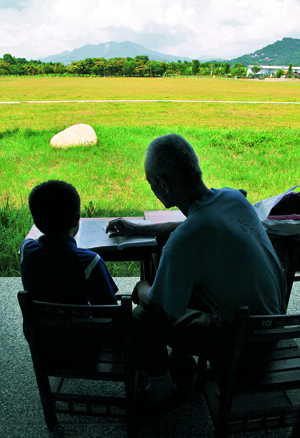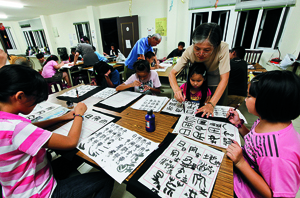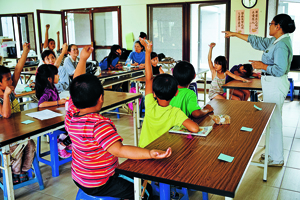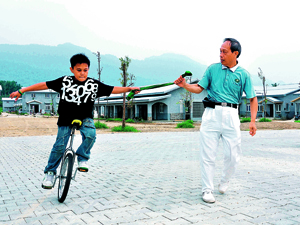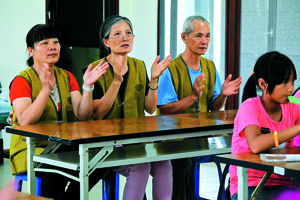

| The Road Back to Normal—After-School Supplementary Classes | ||||||||||||
| By Zheng Ya-ru. Translated by Tang Yau-yang. Photos by Lin Yan-huang | ||||||||||||
In 2009, Typhoon Morakot devastated their homes in the mountains. They relocated to Shanlin Great Love Village, where a tutoring program has been established to help the children learn and grow. In 2009, Typhoon Morakot heavily damaged some mountain communities in Kaohsiung, southern Taiwan. Among those areas hit hard were Namaxia, Taoyuan, Jiaxian, and Liugui. The typhoon made many homes here uninhabitable. “We lived in Liugui,” said Zhang Xiang-wen (張湘雯), one of the displaced. “When the slopes near our house gave way, our house was split down the middle.” Some regions of the mountains in that area are now geologically unstable and unfit for human habitation.
In the aftermath of the disaster, Tzu Chi built Shanlin Great Love Village, a community of permanent homes for typhoon victims. Just over a thousand families relocated there, including Zhang, her husband, Lu Feng-ming (盧豐明), and Chen Li-hui (陳麗惠). Chen grew up in Shanlin. She and her husband had suffered property losses from natural disasters several times in the past. They were hit by a great earthquake in 1999 when they lived in Taichung, central Taiwan, and by Typhoons Kalmaegi in 2008 and Morakot in 2009. After settling into Shanlin Great Love Village, Chen began noticing disconcerting behaviors among some of the children in the village. She saw a boy, about seven, calling a driver bad names after the driver honked at him; an eight-year-old was shunned by his schoolmates because he smelled; some children wandered around very late at night, and some peppered their speech with swearwords. Many of these children were from single-parent or low-income families, or were being cared for by their grandparents. After Typhoon Morakot forced them from their homes, some of the children drifted from place to place, living in temporary accommodations. Such children are especially susceptible to developing negative attitudes to life if their families cannot provide them with the sense of security and certainty they need during this formative time in their lives. Chen and Zhang had been volunteers at elementary schools, as well as teachers in after-school programs. They could not sit idly by and watch these kids; they wanted to help in whatever way they could to get the children back on track. In 2010, after residents started moving in, a development association was formed. The association applied for government grants to help pay for the many needs of the new community, including helping residents settle and find jobs. A tutoring program was set up in 2011 with money from these grants. Teachers were paid for their service, but the program was free to students. Zhang and Chen joined the program and helped recruit students. They knocked on one door after another in the community, told parents about the program and asked them to sign their children up. However, despite being free, the program was not enthusiastically embraced at first. Most residents at the time, being new to the area, were not familiar with each other, nor did they generally grasp the potential benefits of the program. Therefore, few of them showed much interest. Even those who did sign their children up did not really buy into the program. Some dubious parents would hover outside the classroom to observe how the class was going. Some just showed up at the end of the class to pick up their children without bothering to greet the teachers. Even worse were some hot-tempered parents, who were outright rude to the teachers.
Zhang understood the unfriendly attitudes of the parents. “We all used to live in the mountains, where there were few neighbors and everyone knew each other,” she explained. “When I first moved to this community, which is huge to us, I felt out of my element too. In addition, starting a new life here came with financial pressures we had to deal with. That put us on edge too.” But despite the initial difficulties, Zhang stayed with it. She kept explaining to parents the contents of the after-school supplementary classes. Eventually, her patience paid off as she gradually won their trust.
The program Most students in the classes are between seven and ten years old and do not remember much about Typhoon Morakot. If they have any impression of that typhoon at all, it is something like, “I rode in a helicopter,” referring to the vehicle that evacuated them out of their hometown to safety. Nguyen Yen Anh, who originally hails from Vietnam, came to Taiwan to marry her husband. They used to live in an aboriginal tribal settlement in Liugui, but it was practically annihilated by Morakot. After they escaped, they moved from rental to rental, forcing their daughter to transfer from one elementary school to the next. That finally stopped when they settled in the village of Shanlin. Nguyen works on a farm near the village. The work is demanding and exhausting. She cannot help her daughter with her schoolwork, so she signed her up for the tutoring program. “Teachers came to our home and invited my daughter to join the program. They even take her to the tutoring sessions on their motor scooters. I’m very thankful,” Nguyen said. “My daughter liked the sessions and she made a lot of progress in her lessons, so I later signed my son up as well.”
At the height of the program, there were more than fifty students and five teachers, including Zhang and Chen. “The five of us worked together to design and plan the courses,” Zhang recalled. “We wanted to make the program fun and educational.” A happy look appeared on her face as she recalled the enthusiasm of the teachers. However, at the end of 2013, the application for the government grant upon which the program had been launched and sustained for two years was turned down. No funding meant no pay for the teachers. As a result, all of the teachers, except Zhang, left. They had to make a living after all. “I thought that it would be a pity if the classes ended just like that, so I kept it going,” Zhang said. She did it as a volunteer, and lived only on her income from doing handiwork at a workshop in the village. Later her husband and Chen joined her. The tutoring program was thus sustained on the backs of these three volunteers. In June 2014, Tzu Chi established a special project to fund the tutoring program. The three volunteer teachers began to receive pay for their work, which eased their financial pressures.
Guiding with patience It’s past 6 p.m., but bicycles pack the area outside the tutoring classroom. The class, which will last three hours, is under way. Students do their school homework here. Lessons in English, calligraphy, story time, movies, and arts and crafts are rotated to keep students engaged and interested. A “play area” is nestled in a corner of the classroom for those who need to recharge their batteries. Snack time and exercise time are enduring favorites of the children. The three teachers complement each other, each doing their own part. Chen is easygoing, so the children tend to go to her if they have questions or want to chat. Zhang is more strict, and the children are a little scared of her, but they know that she cares about them a lot. They love Lu’s English vocabulary lessons because they signal the end of in-room time and the beginning of outdoor basketball time.
Chen jokes around often and is more childlike, so she teaches more playful sessions. Her approachability has even led some children to confide in her. “My daughter tends to keep her feelings to herself,” said Chen Xiao-qiao (陳小巧), a parent, “but she shares a lot with Chen. Sometimes I rely on Chen to learn about what’s going on with my daughter.” The teachers try their best to help the students. For example, Chen once found that second grader Xiaoxin was being ostracized at school because he often did not wash himself. “Whenever I noticed that he was smelly, I would ask him to go home and wash first before coming into the class again,” Chen said. “If he came in washed but with the same clothes, I’d find a change of clothes for him.” One time Chen found him very nicely washed, so she praised the boy. “Wow! You smell good, and you look good!” Hearing the praise, the boy looked shy but pleased with himself. Chen believes that all he needs is a little pat on the back. There are over 20 students in the program. Guiding and caring for them, the teachers find them faced with different challenges: Some children are inattentive, some have foul mouths, and some are unruly. While they may exhibit various problems, Zhang believes that the underlying cause for their behavior is their desire to be noticed, to be loved. That’s why she often says and shows that she loves them. “I often say ‘I love you’ to students, and I often embrace them or hold their hands,” Zhang said. At first, not accustomed to this way of expressing affection, some children say that it is disgusting. But after some time, Zhang can tell from their facial expressions that they actually revel in the affection and love the teachers show for them. Zhang is good at designing games that are fun, meaningful, and behavior-molding. In the game of “a pinch of love,” for example, a child gets a gentle pinch on his cheek if he says a bad word. Soon children get the idea and become more mindful of how they talk.
“Children learn very fast. They absorb everything you teach them,” Zhang says. Therefore she reminds herself to always watch out for what she says or does. Even so, Zhang contends, the circumstances at the kids’ homes are such that they may very quickly forget the proper way of doing things they have just learned in the program, and revert right back to their old ways, the ways they learned at home. Facing such stubborn and negative family circumstances and influences, all that a teacher can do is to repeat the lesson all over again and give them unconditional love.
Good influences In addition to the night program that Zhang, Chen and Lu teach, members of the Tzu Chi Teachers Association from Kaohsiung have been holding another kind of after-school program every Wednesday afternoon for more than five years. This program focuses on nurturing good character in the children by sharing Master Cheng Yen’s teachings. “The volunteers come all the way from Kaohsiung,” said Zhang, “and they have done more than just teach the children. When they first started, they saw that our restrooms were filthy, so they cleaned them up. There was a volunteer who prepared beverages for us. She had to drive a scooter, ride on a bus, and then ride in a volunteer’s car to get to the village.” The volunteers would also go to students’ homes and bring them one by one to the class. Zhang was very touched by the volunteers’ giving. Their spirit spilled over to her. “Later, I cleaned our restrooms, got drinks for students, and got students to the classroom beforehand so the volunteers could just come to the classroom and teach their lessons,” she said. The Tzu Chi volunteers have also developed in Zhang a new perspective when it comes to working with students and parents. She has become more receptive and tolerant of behavior or people that she once deemed objectionable: difficult, naughty students or unreasonable, rude parents.
Instead of getting ruffled by such people, “now I concentrate more on keeping the children in class,” Zhang commented. “So long as they show up in the classroom, I have a chance to teach and influence them.” That is why whenever she hears students say “I’m bored” in class, she racks her brains when she gets home to come up with lesson plans that are fun and educational. With guidance from the Tzu Chi volunteers, students have learned many Jing Si aphorisms—short sayings by Master Cheng Yen. “We read them aloud in class,” Zhang said, “and a student must recite an aphorism before he or she may leave the classroom for recess.” Tzu Chi promotes recycling and environmental protection, so in that spirit Chen leads children each Sunday morning in picking up recyclables around the village and sorting them out. Then she takes the children to breakfast. In this process, the children gradually form their ideas about preservation and they grow closer to Chen. “They’re simple,” Chen remarked, referring to the kids. “When I told them, ‘It’s time to call it a day,’ they often said, ‘But there’s still so much more to pick up and sort!’” Eventually they began to ask Chen why there was so much garbage and why people threw their rubbish on the ground instead of into garbage cans. These were great occasions for her to engage the children in thought-provoking conversations. Second grader Hong-an has been with the tutoring program for more than two years. He loves the classes “because I can do my homework, learn English, and play.” His mother, Nguyen Yen Anh, has noticed his growth, and she proudly recalled some notable examples of maturity in her son: “When I had a fever, he put a wet towel on my forehead, brought me water, and reminded me to take my medicine. Since I taught him how to use the washing machine, he’s often done the washing for us. Even when his sister dumps chores on him, he does them.”
A corner of Shanlin Great Love Village Though they have settled into their new homes, Chen and Zhang still need to keep an eye on their livelihoods. “Because we only get short-term work, it’s hard for us to do long-range planning, and I’m worried sometimes,” Chen said. She and Zhang sometimes help pick tomatoes in farmers’ fields to earn a little extra income. Despite the uncertainties facing them, they feel abundantly rewarded with the satisfaction that many children have changed for the better and are better prepared for the game of life. Commenting on her four years with the tutoring program, Zhang smiled as she said, “These mountain children are free-spirited and very creative, so they can really make great progress if they can only settle down. I believe that the lessons on Jing Si aphorisms and calligraphy are greatly beneficial to them. Now children can actually sit down with me and sensibly discuss any issue that they may be facing.” It is 9:00 p.m. The three-hour class has come to an end, but some children are not ready yet to call it a day. Though quite tired, Chen watches them play basketball at the side of a basketball court. The three teachers, all older than 50, often have a hard time keeping up with the boundless energy in the children, but they often just dip deeper into their energy store in order to stay with them. “I’m over 50, but I don’t want to just sit around not doing anything good—I want to help,” Chen said. “I really don’t know how much longer I have left to do this, but I know I’ll do my best. I just love to spend time with the children.” “Though we suffered great losses in Typhoon Morakot, we were lucky enough to get a new house to live in,” Zhang observed. “I feel blessed that I can accompany these children, and this is my way to pay back to society.” The village is home to them now. While they still can, they want to help make it a better place to live. |

















|

